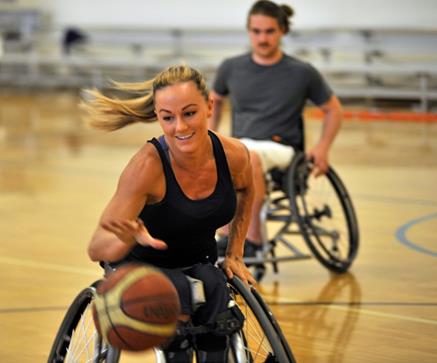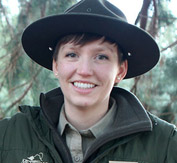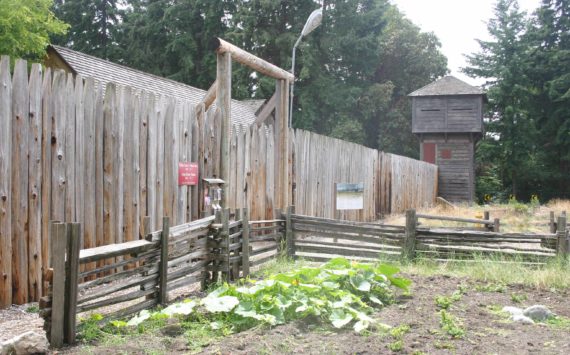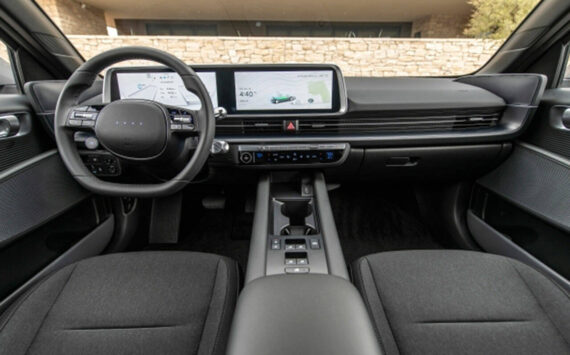By Metro Parks Tacoma
Megan Blunk didn’t see much of a future for herself after she broke her back in a motorcycle accident eight years ago.
At Gig Harbor’s Peninsula High School, she’d been a five-sport player, but disability laid her low. Luckily, a chance meeting with another athlete turned her on to her enduring passion: wheelchair basketball. She joined the Metro Parks Adaptive Recreation program and earned her chops as a hoopster with Metro Parks’ Tacoma Titans coed team.


Now 26, she’s headed to the 2016 Paralympics in Rio de Janeiro with the United States women’s wheelchair basketball team, one of several favored to medal. Other likely contenders are the Netherlands and Germany. The U.S. team’s first game is Sept. 8.
“It’s an exciting team to be on because you never know what’s going to happen next,” she said. “Everyone’s funny and fun.”
Blunk isn’t a starter on the 12-player roster, but she’s known as a game changer, with plenty of speed and energy. In a conversation a few days before leaving for Rio, she shared her eagerness to roll onto the court. “I do the dirty work for the shooters,” she said, “Dive for the ball, protect, set up screens, cut up the defense, make things happen.”
Blunk caught the attention of the national team’s coaches because she played college-level wheelchair basketball. After community college, she won an athletic scholarship to the University of Illinois. There she completed her bachelor’s degree and is on track to graduate from the university with a master’s in social work in December 2017.
Playing on the national team has elevated her to a position of prominence from which she hopes to inspire others struggling to overcome the setbacks of disabling injury.
As an advocate for adaptive sports, she enjoys opportunities to meet and speak to assembled groups and to counsel others. “Whenever I meet someone recently disabled, I reach out to them,” she said. “I would be there in a heartbeat if someone asked me to see someone who had just been injured.”
The urge to extend herself to others going through similar life-changing experiences stems in part from her own disappointment. She recalled that when she was hospitalized and facing the prospect of paralysis, she didn’t meet anyone like her who might have inspired her. “I wanted to meet someone who could tell me, ‘You can get through this. You can be happy again.’’’
Recently, she dropped in on Metro Parks’ Adapt to Achieve youth day camp and helped a young camper get comfortable with wheelchair basketball. After she returns from Rio, she’s signed up to coach a children’s camp in Seattle called Dribble on Wheels.
Besides hoops, Blunk has competed in world-class kayaking. In 2013, she won two silver medals in the world paracanoe championships in Germany. In 2014, she competed in Moscow, placing forth.
Blunk is not a big woman – her basketball team’s roster lists her at 5-foot-3 and 115 pounds – but her buff musculature stands out when her shoulders and arms are bare. In the weight room, she said she can bench press 115 pounds three times in 5 seconds. To exercise her biceps, she curls 25 or 30 pounds.
With the support of the National Wheelchair Basketball Association, Blunk and the national team have traveled a lot. The team competed in an international tournament in Germany and has practiced at the Olympic training center in Colorado Springs, Colo., and at Lake Placid, New York.
When she returns from Rio, Blunk plans to resume regular practices in Tacoma with the Metro Parks’ Titans. She’s also scheduled for ankle surgery, which could improve her limited ability to walk.
After that, she’ll begin looking for a local internship, a requirement to complete her social work degree, and expects to gradually turn her attention to her future career.
But she doesn’t believe she’s reached her personal best in wheelchair basketball and could aim to compete in the 2020 Paralympic Games. “I want to be a starter. I want to be a shooter,” she said. “I know my potential is better than this.”
Her advice to others with disabilities is much the same: “Don’t give up. Don’t let anyone tell you no.”
– Metro Parks Tacoma








